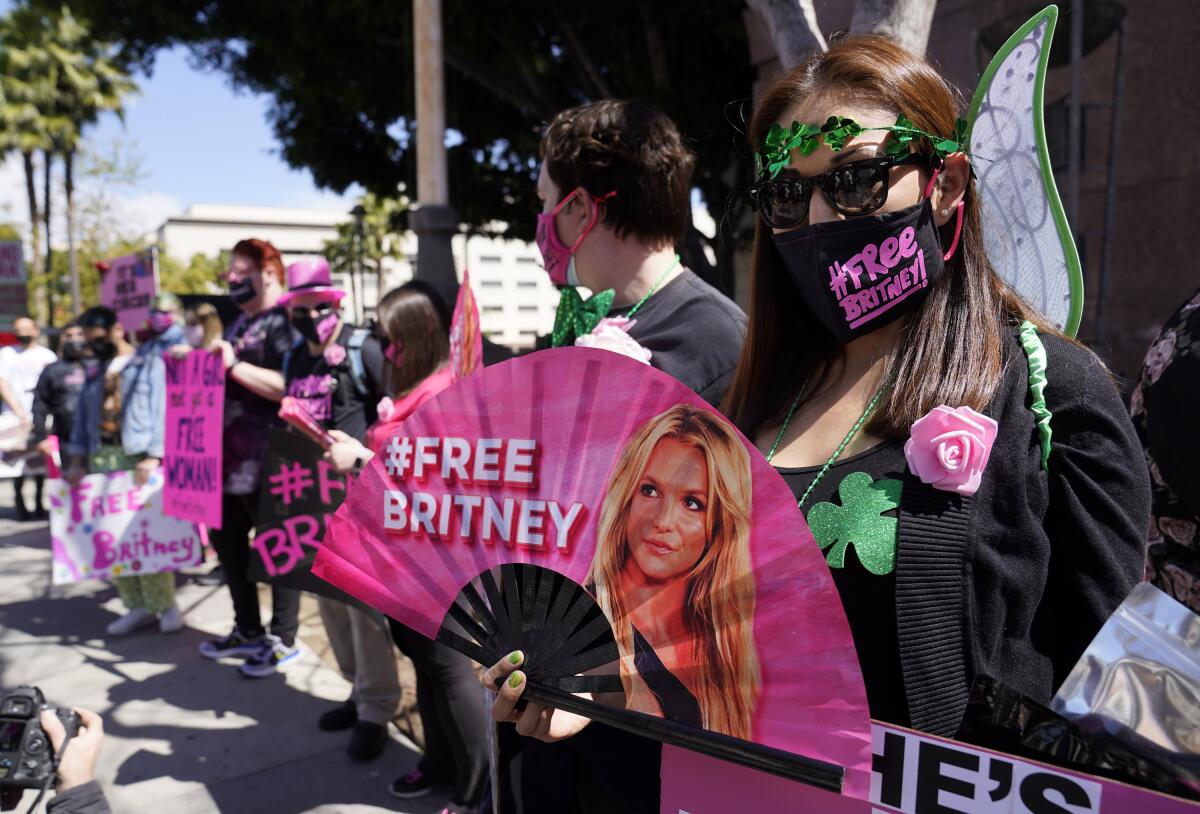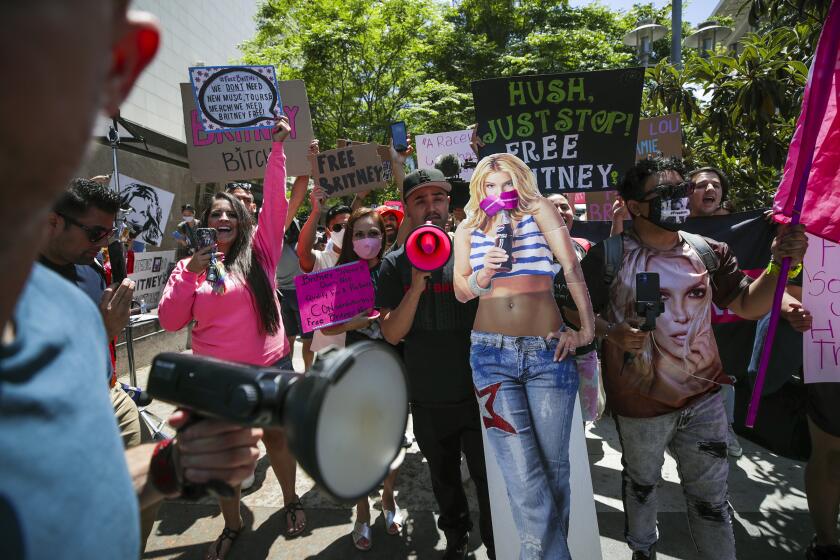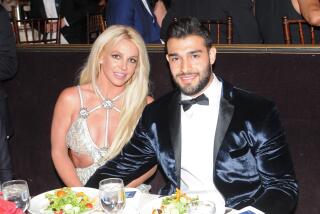Column: Britney’s courtroom statement was a woman’s plea for human rights

- Share via
The testimony of Britney Spears almost defies belief. In an unconventional but poetic speech before a Los Angeles probate judge on Wednesday, Spears described the shock, trauma and manipulation that has characterized her 13-year indenture to what she alleges is a brutal system of subjugation, medicalization and forced labor.
What came through in her 24-minute psychic catharsis, studded with interruptions by the judge instructing her to slow down, is that Spears has been essentially jailed by a battery of doctors, lawyers, coaches, therapists, directors, producers, interrogators, managers and minders, all of whom are on her own payroll.
“I work for the people whom I pay,” she said, simply.
In short, Spears was pleading for her rights as a human being. And the case she made doubled as the case for anyone trying to break free of domination, especially patriarchal domination.
The unkindest cut is that this inhumanity has been overseen by Spears’ father, Jamie Spears, whose alleged cruelty as her state appointed “conservator” has kept Britney alienated from her body, her fortune, her children and even her own heart and mind.
“Anything that happened to me had to be approved by my dad,” she told the court. And then a few sentences later: “I cried...and he loved every minute of it. The control he had over someone as powerful as me — he loved the control to hurt his own daughter 100,000%. He loved it.”
Spears paints a vivid picture of herself singing and dancing on a grueling schedule and subsidizing too many dependents to count, all while being treated as chattel. “The only similar thing to this is called sex trafficking,” she said.
Spears, who has an 11th-grade education, much of it conducted on sets, knew her stuff. “I’ve done a lot of research, ma’am,” she told the judge. It showed. She spoke knowledgeably of her rights.
“I want to end the conservatorship without having to be evaluated.”
Britney Spears finally spoke out about her conservatorship, but what’s next? ‘Once the system gets ahold of you, it is hard to get out,’ an attorney says.
By “evaluated,” she meant subjected to psychological tests that were supposed to be the gateway to her freedom. When her father told her she “failed” the evaluations, he consigned her to what she said he called “a small rehab program that we’re going to make up for you.” It would cost her $60,000 a month, Spears told the judge.
Among Spears’ most harrowing allegations is that her overseers, led by her father, exercised near-torturous control of her body.
“They all lived in the house with me, the nurses, the 24-7 security.... They watched me change every day — naked — morning, noon and night.”
When, exhausted, she refused to do another Las Vegas show, she was taken off her “normal meds” and put on lithium “out of nowhere,” with the phalanx of nurses to ensure her compliance. “I really couldn’t even stand up for myself,” she said, adding that she felt intoxicated.
Though Spears says she is eager to marry again and have another child, she told the court she has been forbidden to have a doctor remove the intrauterine contraceptive device in her uterus. That alone sounds akin to forced sterilization, a grave human-rights violation.
Spears will be 40 in December. She has two adolescent sons, Sean and Jayden, whom she has been largely kept from, in custody arrangements favorable to her father or her ex-husband Kevin Federline. (In 2018, Federline, a sometime DJ, asked Spears for a raise from $20,000 to $60,000 a month in child support payments; they settled on an undisclosed sum.)
In a March post to Instagram showing her with Sean and Jayden, Britney wrote that she was pleased her sons “let” her post the photo: “Now I don’t feel left out anymore.”
Even before the conservatorship , Spears lived as an object, a media and pop culture target of derision, of pity, of analysis, of real indifference to her humanity.
The mere fact that she stood up for herself so forcefully on Wednesday was in itself remarkable.
“I have a lot to say, so bear with me,” she started, and however difficult her words are to hear, anyone seeking to understand patriarchy — not as a classroom buzzword but as a reality — must listen.
The Organization for World Peace describes patriarchy as a system of “male dominance [that] dictates women’s career paths, personal image, safety, security, and countless other aspects of their lives.” Let’s put it more simply: It’s a political and economic system in which men own women and children.
Dozens of countries have implemented patriarchy as an explicit form of government, particularly in the “patriarchal belt” across the Middle East, North Africa and South Asia. In other places, a less formal version of it prevails, in which poor women and women of color suffer the most.
Spears’ story, while distinctive in the particulars, is not unique. But her deeply moving testimony sheds a bright light on the specific and brutally disfiguring effects that patriarchy has on girls and women even far from the patriarchal belt, whose rights should be guaranteed.
“I want to speak to you about my obligations,” Spears said at one point. “I personally don’t think at the very moment I owe anybody anything.” Amen.
More to Read
A cure for the common opinion
Get thought-provoking perspectives with our weekly newsletter.
You may occasionally receive promotional content from the Los Angeles Times.











